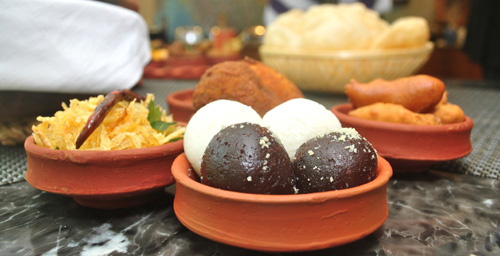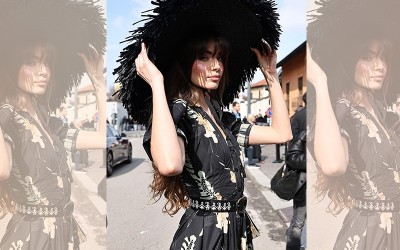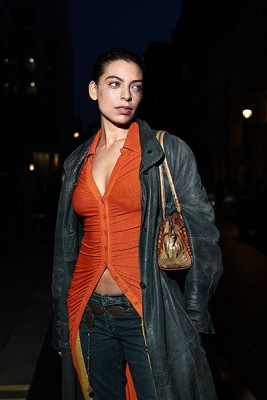April 11, 2025 06:12 pm (IST)

Bengal ushers in new year today
Kolkata, Apr 15 (IBNS): The dawn of Tuesday brought along new fervour, joy and prosperity in the land of West Bengal with the Bengali community all gearing up to wish and hug each other to celebrate the auspicious occasion of Poila Baishakh (the first day of the Bengali calendar), which marks the 'Nababarsho' or the Bengali new year.
This day generally occurs on the 14th April or 15th April, and is celebrated in both Bangladesh and the Indian state of West Bengal, as well as among Bengali communities in the other Indian states, including Assam, Tripura, Jharkhand and Odisha.
On this occasion, West Bengal Chief Minister Mamata Banerjee greeted the community across the country and abroad.
"Baisakhi and New Year festivities of Rongali Bihu, Puthandu, Vishu, Maha Vishuva Sankranti, Juir Sheetal, Basoa are being celebrated by my brothers and sisters in many parts of the country and abroad," Banerjee posted on her Facebook page.
"My heartiest greetings and best wishes to all of them, their family and friends. May the festivities strengthen the bonds of brotherhood and usher peace, happiness, prosperity and good health in your lives," her message read.
The Bengali calendar, which is now in 1421th year, is loosely tied with the Hindu Vedic solar calendar, based on the Surya Siddhanta. As with many other variants of the Hindu solar calendar, the Bengali calendar commences in mid-April of the Gregorian year. The first day of the Bengali year therefore coincides with the mid-April new year in Mithila, Assam, Burma, Cambodia, Kerala, Manipur, Nepal, Odisha, Sri Lanka, Tamil Nadu and Thailand.
The development of the Bengali calendar is often attributed to King of Gour or Gauda, Shashanka as the starting date falls squarely within his reign.
Mughal Emperor Jalaluddin Muhammad Akbar, the renowned grandson of Zahiruddin Muhammad Babur, who was the 3rd Mughal Emperor, introduced the Bengali Calendar.
In regards of relatively easier tax collection, Akbar changed the practice of agricultural tax collection according to Hijri calendar and ordered an improvement of the calendar because the Hijri calendar, being a lunar calendar did not agree with the harvest sessions and eventually the farmers faced severe difficulties in paying taxes out of season.
The Bengali New Year begins at dawn, and the day is marked with wishing, greeting and seeking blessings from elders.
Several cultural programmes are hosted in different communities in Kolkata with singing, processions and fairs dominating them. Ladies are witnessed clad in white saris with red borders and men clad in dhuti and kurta take part in the Probhat Pheri or early morning processions to welcome the first day of the year.
Traditionally, businesses start this day with a new ledger, clearing out the old debts. The shops generally hosts a 'puja' and invites the customers to clear old debts.
Food is an important element of the day, since no celebrations in India are complete without food. Several Bengali cuisines are prepared at Bengali homes with sweets being a compulsory item to go along.
On this day, people wear new clothes and go about socialising.
Choitro, the last month of the previous Bengali year, is the month of hectic activities and frantic purchases. Garment traders organise a Choitro sale to attract consumers with heavy discounts.
This day being auspicious also witnesses the start of new businesses and new ventures. The Mahurat is performed, marking the beginning of new ventures.
The Bengali Hindu traders purchase new accounting book. The accounting in the halkhata begins only after offering puja. Mantras are chanted and "Hindu swastika" are drawn on the accounting book by the priests.
Long queues of devotees are seen in front of the Kalighat and Dakshineshwar temple from late night. Devotees offer puja to receive the blessings of the almighty in the new year.
Long queues are also spotted in front of restaurants and other food joints in Kolkata.
Ushering in the new year, Bengali film actress Swastika Mukherjee and Tollywood biggie Prosenjit Chatterjee tweeted a Happy Bengali New Year, 1421 to all.
Director Sujoy Ghosh posted in Bengali: "Happy Bengali New Year..Stay happy and love always."
Support Our Journalism
We cannot do without you.. your contribution supports unbiased journalism
IBNS is not driven by any ism- not wokeism, not racism, not skewed secularism, not hyper right-wing or left liberal ideals, nor by any hardline religious beliefs or hyper nationalism. We want to serve you good old objective news, as they are. We do not judge or preach. We let people decide for themselves. We only try to present factual and well-sourced news.
Support objective journalism for a small contribution.
Latest Headlines
Flower Shop and Delivery: How to Surprise Someone You Love
Tue, Apr 08 2025
‘The Sona Story’ celebrates life, legacy of C. Valliappa
Sat, Apr 05 2025
Bengali music industry icons participate in 'Bhalobashi Bangla Ke – Naboborsher Maha Jolsha'
Fri, Apr 04 2025
Boost Your Experience with the Best Gambling Games in India
Mon, Mar 31 2025
Kolkata: Ethnic Boutique presents 'Elegance in Empowerment' to celebrate women achievers
Tue, Mar 11 2025
Over 200 women to participate in All Ladies Car Rally in Kolkata to celebrate International Women's Day
Fri, Mar 07 2025







